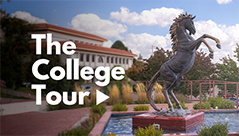Western New Mexico University recognized Banned Books Week on Tuesday, September 17, 2024, with an event in J. Cloyd Miller Library.
Miller Library Director Samantha Johnson opened the event by speaking about how the American Library Association created Banned Book Week over forty years ago to call attention to the increase in challenges to books in libraries, bookstores and schools. “Unfortunately,” she said, “we are still dealing with the problem of censorship in libraries today, as well.”
Following Johnson, WNMU Writer-in-Residence JJ Amaworo Wilson spoke about the power of the written word. “Reading opens your mind,” he said. “It teaches you that there is another way to live in this world. Books are often likened to both a mirror and a window. They are a mirror in that you can see yourself reflected in stories. They are a window in that you can see beyond yourself. You can see outside. You can see how other people live, and, of course, that is how reading fosters empathy.”
After Wilson’s talk, Associate Professor Heather Frankland introduced students from her English 099 class, who presented on two books that have been banned, Luis Alberto Urrea’s “The Devil’s Highway” and Tim O’Brien’s “The Things They Carried.” Emily Bocken, who presented on Urrea’s book, said that reading it opened her eyes to the migrant experience. “Reading allows people to obtain knowledge from other people from anywhere across the world,” said Bocken. “It gives us the freedom to engage with the world.”
In addition to Frankland’s English 099 students, high school students from Aldo Leopold Charter School also gave readings from an often-challenged book, George Orwell’s “Animal Farm.”
Following the student presentations, artist Linda Anderson gave a presentation on cartoneras, a social, artistic and political publishing movement with roots in Argentina. According to Anderson, writers and artists faced with economic crisis some twenty-three years ago began publishing their own books made of recycled cardboard. The book covers are hand painted, and the books are sewn together and sold at a nominal price to increase access to literature and allow writers to reach new audiences. The cartonera movement, said Anderson, is really about the “democratization of literature.”
The next speaker was Frankland, who in addition to teaching at WNMU is also the current Silver City and Grant County Poet Laureate. Frankland gave a talk about banned poetry, focused on the twentieth-century poet Gwendolyn Brooks. Brooks’ poem “We Real Cool,” said Frankland, was challenged when taught in schools because some readers misconstrued a line in the poem to be about sex, which was deemed inappropriate for school-aged readers.
Frankland concluded her talk by emphasizing the detriments of book banning. Referring back Wilson’s point about literature’s power to foster empathy, Frankland said, “We are living in a time when we need to up our empathy in order to connect to others.”
Following Frankland, third-year student Anais Orantez spoke in her role as editor of “The Maverick,” the student-led academic and literary journal. Orantez spoke about the freedom her parents afforded her as a young reader and about how being allowed to read whatever she chose did not prepare her for the controversies surrounding censorship she encountered in high school. Orantez grew up in Arizona, where a ban on teaching ethnic studies had been in place since 2010.
Orantez learned about the effects of the law in her Mexican American government class during her senior year. From her teacher, she said, she learned how “Students would cry because books were being taken from their shelves, and they weren’t allowed to learn about their history and their culture. … From then I decided I had to fight against censorship in all aspects of life.”
This determination, said Orantez, fuels her work as editor of “The Maverick.” “That is why I am here today: to let student know that you have a voice. You are able to publish, and you are able to have your thoughts shared,” she said.
Outreach and Instruction Librarian Madeleine Nittmo concluded the event. “The freedom found in books is not just in the stories they tell,” said Nittmo, “but in the power they give us to reshape our own narratives, to confront our own fears and to dream bigger than the confines of our own reality. The movement to ban books not only threatens the availability of certain stories but also curtails the fundamental right to explore different perspectives, challenge prevailing norms, and cultivate empathy by exploring diverse voices. Books provide a sanctuary where readers can navigate complex emotions, question societal structures, and dare to imagine alternative futures.”


